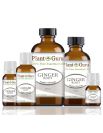Ginger Essential Oils
Also referred to as ginger root oil, these essential oils originated in China and are derived from their respective plant through steam distillation. With a thin consistency and an aroma that has been described as a ginger spice, warm and spicy they have, for thousands of years, been used in folk medicine. It is likely, however, that most people are more familiar with ginger being used as a spice for baking and in cooking. These essential oils are said to blend extremely well with other spice oils in addition to sandalwood, orange, spearmint, neroli, rosewood, myrtle, patchouli, geranium, frankincense, eucalyptus, lime, cedarwood, lemon, black pepper, cardamom, and bergamot.
Overall Benefits of Ginger Essential Oils
- Used to assist in the elimination of impotency
- Beneficial in the treatment of menstrual cramps
- May help to dissolve kidney stones
- Useful in the treatment of digestive issues, yellow fever, and malaria
- May relieve respiratory issues
- Believed to strengthen the heart
- Can reduce inflammation
In addition to the above-stated benefits, and as reported by the American Cancer Society, research has pointed to the usefulness of ginger essential oils in the treatment of cancer.
Uses for Ginger Essential Oils
The most common uses of ginger essential oils are as an aphrodisiac, a self-confidence revitalizer, and as a way to renew vitality and ease anxiety. Their warming properties help ease joint stiffness and relieve muscular aches, spasms, and cramps. Aromatherapists are fond of applying ginger oil’s properties to fight nausea (morning sickness, motion sickness), flu, and colds. These essential oils are also effective in the treatment of circulation issues, coughs, and rheumatism.
Precautions
Though no ill side effects have been reported from the use of ginger essential oils, they are considerably strong and should therefore be used sparingly and carefully.


